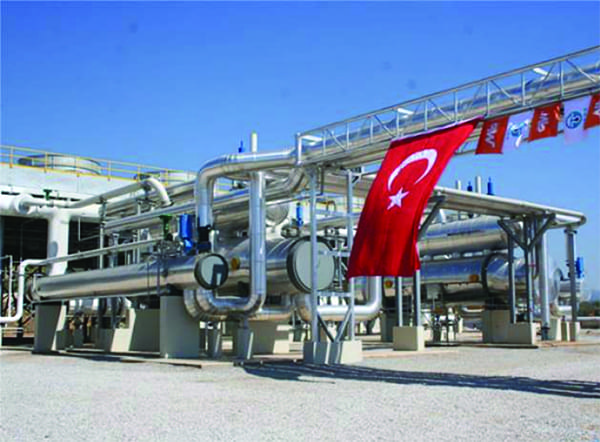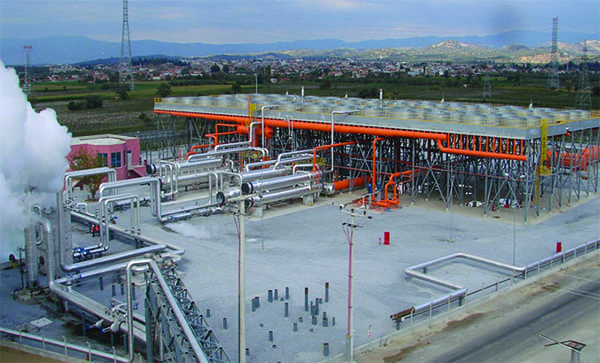Geothermal power generation continues to increase in Turkey, as the country works toward a goal of at least 2 GW of installed capacity by the end of 2019, a rise of almost 50% since the end of 2018. Geothermal energy today accounts for about 2.4% of the country’s total power output (Figure 1), and growth of renewable resources is considered key to reducing Turkey’s dependence on imported power. Recent announcements of several projects, including new units at the country’s largest facilities, highlight growing interest in the geothermal sector.
 |
|
1. The Dora II geothermal plant is a 9.5-MW facility located near Aydin, in western Turkey. It is part of the Salavatli Geothermal Energy project developed by South Pole Group, a company that works with governments and businesses worldwide to design decarbonization strategies. Courtesy: South Pole Group |
After building more than 1 GW of capacity between 2013 and 2018 (the Tosunlar 1 Akca Plant in Turkey was a POWER Top Plant in 2016), Turkey ranks fourth globally for cumulative geothermal power capacity, according to the Renewables 2019 Global Status Report, a report produced by the Renewable Energy Policy Network for the 21st Century (REN21). “Turkey and Indonesia remained the leaders for new installations and accounted for about two-thirds of the new capacity installed,” the report says. It says other countries adding capacity last year were the U.S., Iceland, New Zealand, Croatia, the Philippines, and Kenya. “At the year’s end, the countries with the largest amounts of geothermal power generating capacity were the U.S., Indonesia, the Philippines, Turkey, New Zealand, Mexico, Italy, Iceland, Kenya, and Japan,” according to the report, which notes the majority of Turkey’s geothermal power plants use binary-cycle technology.
“Conversely, most existing geothermal plants around the world use flash- or dry-steam technologies, which are suitable for high-temperature resources,” the report says. “Globally, binary-cycle technology has been the fastest-growing technology in recent years, due in part to the rising use of relatively low-temperature resources.”
Fatih Dönmez, Turkey’s Energy and Natural Resources Minister, earlier this year said the country wants to eventually produce as much as 70% of its electricity from renewable and local resources. Government data show Turkey imported 38% of its power in the first quarter of 2019, with the country producing 62% of its power from local and renewable sources, up from 48.5% a year earlier.
Ali Kindap, president of the Turkish Geothermal Power Plant Investors Association (JESDER), told the Turkish business magazine Ekonomist in January that the country’s proven geothermal energy potential is equal to consumption of 9 billion cubic meters of natural gas, worth $2.2 billion. Kindap said increased use of geothermal energy for district heating systems across Turkey would improve the nation’s economy, reducing the country’s dependence on foreign energy sources.
The REN21 report says Turkey led the world in new-build geothermal capacity in 2018, adding 219 MW, putting the country’s current installed capacity at 1.3 GW. The largest project completed last year was the 65.5-MW Unit 2 at Zorlu Energy’s Kizildere III plant, which increased Kizildere’s total installed capacity to 165 MW, making it at the time Turkey’s largest geothermal plant. Zorlu, Turkey’s largest geothermal energy operator, runs five geothermal plants, with about 330 MW of generation capacity, more than 30% of the country’s total.
The Turkish government subsidizes investments in geothermal energy under its Renewable Energy Promotion Mechanism, known as YEKDEM. The program allows companies to receive tax benefits, and guarantees 10 years of power purchases. The program began in 2005 and is set to expire next year. Projects completed next year will be eligible for the program, although its future beyond 2020 is uncertain.
 |
|
2. Two new units have been added to the EFELER geothermal plant, and a third is under construction. When complete, the plant will be Turkey’s largest geothermal facility with 260 MW of generation capacity. Courtesy: Guris Holding |
The JESDER group has asked the government to provide additional incentives for geothermal projects, and Ufuk Sentürk, the organization’s board chairman, has said “geothermal energy is a very important resource in terms of sustainability and energy supply security” for Turkey. The JESDER group in August reported that $350 million had been secured to finance three new units at EFELER (Figure 2), which is now Turkey’s largest geothermal plant with 210 MW of generation capacity. Three major development banks—the European Bank for Reconstruction and Development (EBRD), the Asian Infrastructure Investment Bank (AIIB), and the Black Sea Trade and Development Bank (BSTDB)—issued a joint news release saying they would contribute to the financial package. According to EBRD, Turkey’s Gurmat Elektrik, a renewable energy subsidiary of Guris Holding, received the funds.
Nandita Parshad, EBRD managing director for Sustainable Infrastructure, said in a statement: “We are pleased to build on our previous cooperation with Guris Holding, a long-standing client of the EBRD with a strong track record of project implementation. We are also proud to join forces with AIIB, BSTDB and several commercial banks and together provide a comprehensive financing package to the company. The EBRD is committed to helping Turkey develop and diversify its energy mix.”
D.J. Pandian, AIIB’s vice president and chief investment officer, said, “This project represents a number of firsts for AIIB: EFELER is our first non-sovereign-based financing in Turkey, our first co-financing with the EBRD and the BSTDB in the private sector, and our first foray in the geothermal space.”
The EFELER plant is in western Turkey, in the area of the Buyuk Menderes Graben basin, which has been identified as the region with the greatest potential for geothermal energy in Turkey. EBRD said two of the three units—EFE-6 with a 22.6-MW capacity, and EFE-7 with 25 MW—are operational. The third unit, the 50-MW EFE-8 using Ormat Energy Converter technology, is still under construction and expected to be operational next year. The EFELER plant when complete will have eight units with total installed capacity of 260 MW.
EBRD in the news release said Gurmat Elektrik, a company founded in 1999 to build and operate geothermal power plants on the Germencik field in Western Anatolia, will receive $100 million from AIIB, $60 million from EBRD, and $20 million from BSTDB. The financing package also includes $90 million from Isbank, Turkey’s largest commercial lender. The Industrial Development Bank of Turkey TSKB is lending $50 million, and ICBC Turkey is lending $30 million. EBRD said Guris Holding has the second-largest geothermal portfolio in Turkey, owning about 20% of the country’s total generation capacity.
JESDER has said Turkey could add 200 MW to 250 MW annually of geothermal capacity, based on yearly investments of about $1 billion, with a payback period of about five years. The group has estimated the cost of a geothermal well of up to 4,000 meters, with a 60-to-80-day drilling period, at $3 million to $4 million. The country has designated special zones in the western Turkish provinces of Denizli, Manisa, and Aydin, home to numerous geothermal sources, where wastewater from geothermal power plants will be used to heat greenhouses. JESDER has estimated the area’s geothermal output potential at about 3 GW, and has estimated the country’s potential generation for heating residential and commercial properties, including greenhouses, hotels, and swimming pools across Turkey, at 30 GW. Two large projects to heat greenhouses are being developed, including a 650,000-square-meter project—about 7 million square feet—in the Sarayköy area near Denizli. Another similar project is planned near Aydin in western Turkey.
—Darrell Proctor is a POWER associate editor (@DarrellProctor1, @POWERmagazine).
https://www.powermag.com/turkey-banking-on-geothermal-projects-to-boost-domestic-generation/